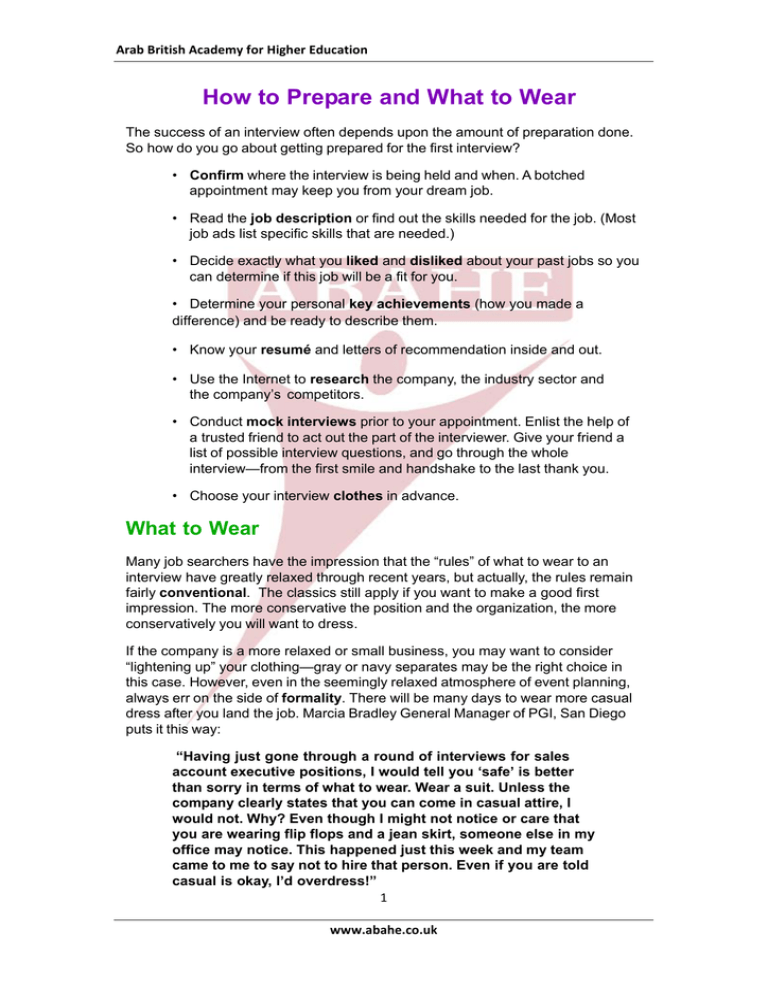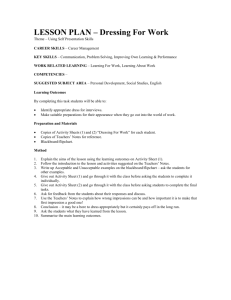
Arab British Academy for Higher Education How to Prepare and What to Wear
The success of an interview often depends upon the amount of preparation done.
So how do you go about getting prepared for the first interview?
• Confirm where the interview is being held and when. A botched
appointment may keep you from your dream job.
• Read the job description or find out the skills needed for the job. (Most
job ads list specific skills that are needed.)
• Decide exactly what you liked and disliked about your past jobs so you
can determine if this job will be a fit for you.
• Determine your personal key achievements (how you made a
difference) and be ready to describe them.
• Know your resumé and letters of recommendation inside and out.
• Use the Internet to research the company, the industry sector and
the company’s competitors.
• Conduct mock interviews prior to your appointment. Enlist the help of
a trusted friend to act out the part of the interviewer. Give your friend a
list of possible interview questions, and go through the whole
interview—from the first smile and handshake to the last thank you.
• Choose your interview clothes in advance.
What to Wear
Many job searchers have the impression that the “rules” of what to wear to an
interview have greatly relaxed through recent years, but actually, the rules remain
fairly conventional. The classics still apply if you want to make a good first
impression. The more conservative the position and the organization, the more
conservatively you will want to dress.
If the company is a more relaxed or small business, you may want to consider
“lightening up” your clothing—gray or navy separates may be the right choice in
this case. However, even in the seemingly relaxed atmosphere of event planning,
always err on the side of formality. There will be many days to wear more casual
dress after you land the job. Marcia Bradley General Manager of PGI, San Diego
puts it this way:
“Having just gone through a round of interviews for sales
account executive positions, I would tell you ‘safe’ is better
than sorry in terms of what to wear. Wear a suit. Unless the
company clearly states that you can come in casual attire, I
would not. Why? Even though I might not notice or care that
you are wearing flip flops and a jean skirt, someone else in my
office may notice. This happened just this week and my team
came to me to say not to hire that person. Even if you are told
casual is okay, I’d overdress!”
1 www.abahe.co.uk Arab British Academy for Higher Education Of course, there are always exceptions to the rule. If you are applying for work
in a totally laid-back environment (a small Hawaiian island company that works
off a beachfront for example), the best advice is to either drop by the company
and see what all the employees are wearing—or call and ask!
TIP:
An important tip if you are traveling to an interview:
Pack your interview clothes and accessories in your
carry-on luggage. Don’t let a delay in getting your
baggage ruin your chances for your new career.
Tips For Women
• Choose a dark two-piece suit or a tailored dress with a jacket.
• Hose should be a neutral color, not chosen to match your suit.
• Limit jewelry and wear conservative makeup and hairstyle.
• Rather than carrying a purse, slip your essentials into your briefcase.
Tips For Men
• Choose a dark two-piece suit (lightweight wool preferred) or a sports
jacket and coordinating dress slacks.
• White long-sleeved shirts are the accepted first choice — pastelcolored shirts are suitable in a more relaxed business setting.
• Be clean-shaven or well-trimmed if you have facial hair. Tips For Both
• Appear neat and clean.
• Buy the best quality clothing you can afford.
• Highly polished shoes still make a strong impression.
• Apply just a hint of fragrance, if any.
• Wear your interview clothes a few times in advance until you are
comfortable in them. Your focus should be on the interview and interviewer,
not adjusting your new clothing.
2 www.abahe.co.uk Arab British Academy for Higher Education All Rights Reserved © Arab British Academy for Higher Education 3 www.abahe.co.uk



